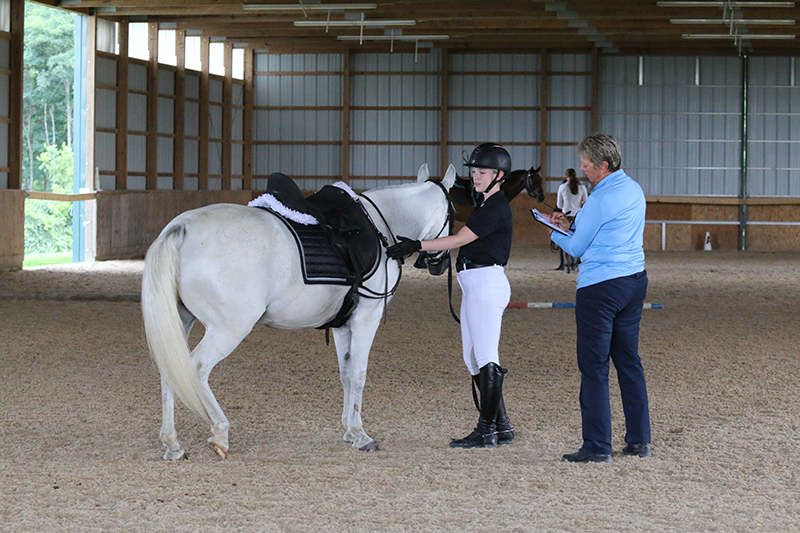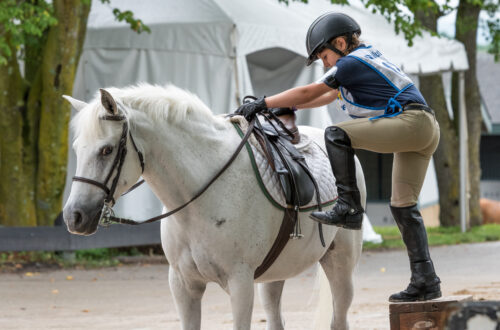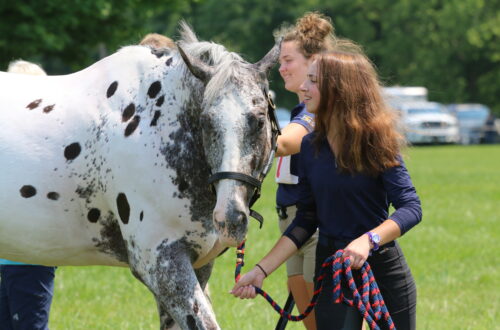
Reducing Test Anxiety
Reduce test anxiety with these tips to help you manage the nerves for your next certification test.
By Sarah Evers Conrad, USPC Marketing and Communications Director
Your nerves have kicked in, despite your best attempts to stay calm. You’re now sweating, nauseous, and your heart is racing. You’ve lost all ability to focus. Your mind races as you try to pull the answer out of your brain, but despite all your preparation for your certification, it’s still eluding you. You glance around at all the stares from other testing candidates as they await your answer. The Examiner awaits your answer. Your anxiety has hit full force. Now what? How do you reduce test anxiety
In a world where mental health is being talked about more often, and more people are learning to deal with things like anxiety disorders and other mental health issues, the United States Pony Clubs is also well into the mental-health conversation. It’s one that gets discussed as the USPC curriculum is developed, and it’s one that USPC leaders are addressing to help members and to help other leaders.
In 2022, National Examiner Nancy Grout presented a webinar to National Examiners (NEs) and others on the topic of test anxiety. She pulled upon her more than 35 years of experience as a high school teacher and more than 40 years of experience as a local examiner and an NE.
Grout defined test anxiety as “the relatively stable tendency to generate disproportionate emotional response in academic assessment situations due to concern about poor performance and possible negative consequences.” She emphasized stable and disproportionate to highlight the extent to which someone could experience anxiety. It goes beyond just your typical nerves or worries during a high-stakes situation, like a certification, an important competition, or a Quiz rally.
Many emotions come with test anxiety, such as fear, anger, helplessness, guilt, shame, and disappointment. In addition, physical symptoms can appear during a bout with test anxiety, including nausea, excessive sweating, headache, dry mouth, a racing heart, shortness of breath, dizziness, and tense muscles, which then make the rider not as fluid with the horse when mounted.

A Diagnosis
According to the Anxiety and Depression Association of America, anxiety disorders affect 18% of adults, with only a third seeking treatment. According to the National Institute of Mental Health, 25% of those 13 to 18 years old are affected, and untreated childhood anxiety can cause children to perform poorly in school and on tests. However, a 2020 study stated, “Since the start of the pandemic, 50% of students reported worsened mental health … a majority reported feeling ‘lonely’ and ‘anxious.’”
While schools are regulated by the Americans with Disabilities Act (ADA) and the Individuals with Disabilities Education Act (IDEA), schools can offer individuals accommodations, modifications to curriculum, special instruction, and goal-setting initiatives to lessen the anxiety through 504s and Individualized Education Plans (IEPs). The United States Pony Clubs isn’t regulated in that way.
“In the last couple of years, that has affected us in Pony Club. In school, due dates have lengthened or laxed because students found it very difficult to meet the stress of the material,” explained Grout.
“For Pony Club, during certifications, we’re trying to get information in a very short amount of time, whereas for school, time extends and it’s structured very differently.”
Despite that difference, accommodations can be requested through the USPC process. For instance, during the briefing at a national test (H-B to A), a National Examiner asks if there is anything a candidate would like them to know, to please see them after the briefing. That is your cue to request any necessary accommodations if you deal with a condition. If medications are a concern, instructors and Examiners may need to be aware for safety reasons. Accomodations may need to be shared among staff, as needed, for safety and the well-being of the rider.
In addition, Connie Jehlik, USPC’s Instruction Services Director, added that it’s a common call to the National Office requesting accommodations. Jehlik recommends talking to your District Commissioner (DC)/Center Administrator (CA) to develop reasonable accommodations ahead of time. “We don’t reduce the Standards, but maybe we provide extra time, or rephrase something, or maybe they do some of their answers in writing, do it by themselves, or need to move around or they need to do more pointing and demonstrating,” explained Jehlik.
Signs of Anxiety
Parents and instructors might see some general signs that show recurring fears and worries about routine parts of everyday life, which then cause the below issues:
- Changes in behavior, such as irritability
- Avoiding activities, school, and social interactions
- Dropping grades or school avoidance
- Trouble sleeping or concentrating
- Substance use or other risky behaviors
- Chronic physical complaints, such as fatigue, headaches, or stomachaches
Those with high working memory can succeed despite having test anxiety, but cognitive symptoms might show up during an event, like a certification, or even during a lesson, such as:
- Difficulty concentrating
- Forgetting everything (like during warm-up or riding to a fence)
- Comparing oneself to others (such as comparing oneself to a switch-ride)
- Racing or jumbled thoughts
- Struggling between answers
- Thinking negatively about performance
- Examples of anxiety during a certification include:
- A candidate freezes during oral presentations and just doesn’t know why they froze
- A candidate experiences self-doubt and psyches themselves out of trying a jumping line again to show a competency
- A candidate might be shaking or experience dry mouth, which causes problems with speaking
- A candidate is so tense that they never relax their muscles during the test, which affects how they ride; and/or
- A candidate has an unusual reaction to an Examiner’s comments.
Navigating Anxiety, Including Test Anxiety
General treatments are available for severe anxiety, such as counseling, to learn methods for coping or to learn to cope with any self-doubt/low self-esteem that could cause performance anxiety. Some might use tools, such as the Calm app, to help reduce test anxiety.
When faced with an anxious feeling, try some of the following techniques:
- Squeeze on a stress ball.
- Use a focus word or develop one with an instructor to bring your focus back.
- Sing/hum a song to help calm down or find your riding rhythm (such as “You Are My Sunshine;” “Mary Had a Little Lamb;” or “Row, Row, Row Your Boat.”).
- Practice mindfulness exercises (e.g., box breathing, imagery, etc.).
- Tell your parents or other adults how you want them to support you in various situations or if you are upset.
- Use an exit strategy, such as asking yourself what you will do in various situations (e.g., You get your certification, but your friend doesn’t. On the ride home, what do you talk about so you don’t upset your friend further.).
- Ask the examiner to come back around to you if you freeze.
- Pet or stroke your horse.
- Stroke down your arm or close your hand into a fist and then open quickly and flick the tension away.
- Count to five to reset and start again.Visualize yourself having success in the moment or find your happy place during a visualization.
- Prepare to lessen anxiety using the following methods:
- Participate in a mock exam or mock Quiz rally or even on a pre-test Zoom call.
- Use different tools for studying (e.g., diagrams, coloring pages, tactile learning, etc.), and don’t just rely on reading and memorization.
- Sit down with a Regional Instruction Coordinator or an instructor and go over the logistics of candidate letters to understand the terminology.
- Use the study materials for D through A members on www.ponyclub.org to prep.
- Make use of the National Testing Feedback Project, which allows current C-2 and above members to submit a video or document of a mounted or Horse Management skill and receive feedback from one or two National Examiners.
- Be a horse holder at a test that you are thinking of taking within the next year or so.
- Practice teaching.
“Practice teaching, we find, is the most important,” said Grout. “For some of us, we were lucky when we came through Pony Club. Our DCs threw us out in the ring early, when we were C-1s/C-2s, maybe teaching the D-1s and D-2s, absolutely with supervision, and that is something that needs to be done. At the H-As, we find the candidates can teach one, maybe two, in a lesson. However, they’re now teaching three or four. And they’re not used to the traffic control, the time, and the environment, such as projecting their voice in wind, because they’ve been only in an indoor. Practicing with a mentor is a great way of having them get ready.”
Key takeaways included the reminder that test anxiety is real and supported by the Americans with Disabilities Act and that compassion is a good thing to have for those in the throes of anxiety.
This article on reducing test anxiety was originally published in the Winter 2023/2024 issue of Discover USPC magazine. Read more content from that issue.





